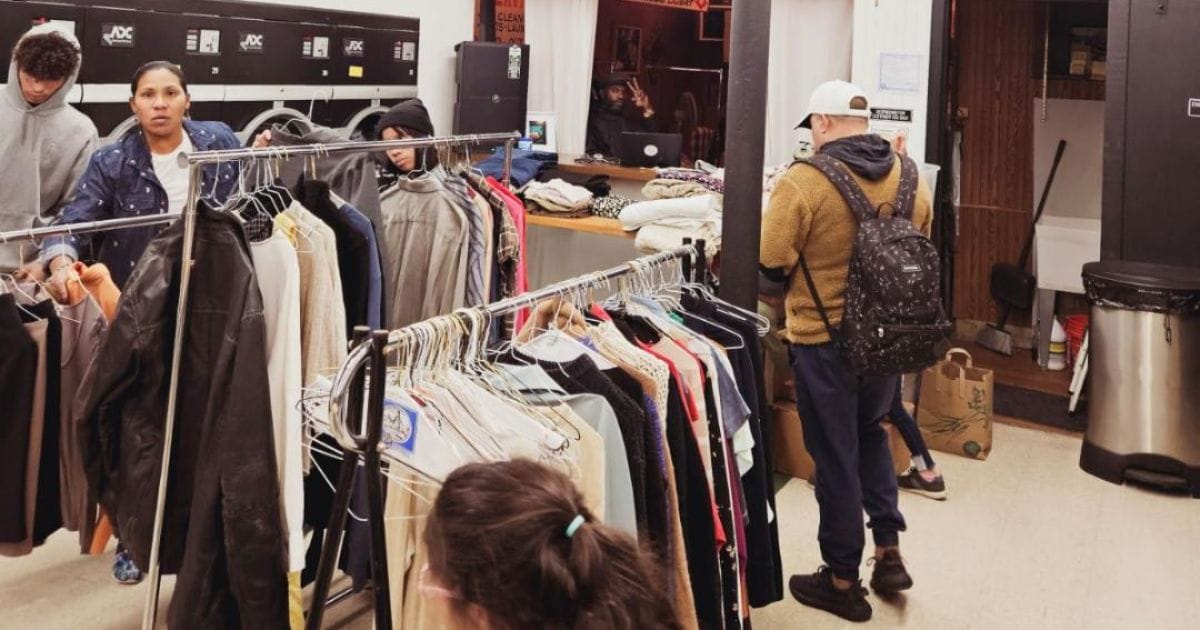Gené Moreno holds Pop-Up for Haitian Migrants at laundromat in Hyde Park.
Unable to get facts about the migrants from the administration and alarmed that Venezuelans say the Haitians are not being treated fairly, Gené Moreno, a community activist in Hyde Park, took matters in her own hands and held a Pop-Up House party that provided a day of service for 200 Haitians.
Proud of her Haitian heritage, Moreno, who lives across the street from the controversial Lake Shore Hotel in Hyde Park where hundreds of mostly Venezuelan migrants were placed, was shocked to learn there were also more than 200 Haitian migrants, many of them sleeping on the floors of a conference room at the hotel.
She was even more disturbed when she learned that many of them were on a city list waiting for interpreters and other resources, which gave the impression that Venezuelan migrants were being serviced first.
Moreno said, “they told me how difficult it was for them to get service because it appears it is only Latinos. They said it takes them longer to get services because there aren’t many Creole or French translators,” who speak those languages. “Everything is [Spanish].”
“There is a nice population of Haitian migrants who came through to Chicago, some who lived in Brazil or Venezuela, running from whatever persecution they were running away from,” she told the Chicago Crusader.
So, among her many legal, business, and social contacts, Moreno, who also speaks Creole, Spanish, French and other languages, called Augustine and Sylvia Emuwa, owners of the Dirty Laundry, 5230 S. Harper, in Hyde Park, who immediately responded and opened their doors. They gave scores of Haitian migrants free washes last Saturday, October 28, in what Moreno called a Pop-Up House Party.
In an interview with the Chicago Crusader, Augustine Emuwa, who is African, said Moreno is a customer of his and he readily supported her cause. “What she wanted to do is a part of the impact we want to make.” He got her a space at a downtown hotel for the overflow of Haitian migrants. “I wanted to support her. I believe in equity and identifying folks, backgrounds and culture. It was great.”
“We are trying to do a campaign to raise 1,000 free washes at $5 a wash for anyone in need, including migrants,” said Moreno. “It was great for them to give us a space. She said the Emuwas offered the Haitians free washes.
“There were people already there washing clothes, and they went home and brought back stuff for the Haitians,” Moreno told the Chicago Crusader. There, Moreno and her volunteers passed out free clothing with some of the Haitians taking off their clothes in the back room replacing them with the donated clothing then washing what they wore into the laundromat.
But Moreno had an overflow crowd; so, as an individual citizen, she connected the Haitian migrants with groups like the Haitian American Lawyers Association and other organizations who spoke their language.
She also called African organizations where people spoke French. Moreno called Haitian lawyers who referred her to a downtown hotel. There she was given a huge room for half the price, which she paid for herself, and allowed for the overflow of Haitians who needed private space to talk to the lawyers.
At the hotel, the Haitian migrants sat in a huge circle and were serviced by Haitian lawyers who spoke their language. Moreno was one of the interpreters who translated Spanish, French and Creole for the Haitian migrants.
“Spanish interpreters are easier to get than Haitian Creole [interpreters]. When you don’t see a Haitian interpreter and others are getting Spanish interpreters, it makes you feel like you are being pushed aside,” she said.
That is where Haitian lawyers met with the Haitian migrants who needed legal advice about work permits, IDs and other services they had yet to receive from the city.
“We were able to get people like DuSable Heritage Association and Sarver Wireless connected with advice and guidance who donated cell phones and SIM cards for their data and tablets,” said Moreno.
When she found out the Haitians had no baby clothes, one of the companies went over to Marshall’s at 51st and Lake Park and purchased a number of $25 gift cards for those with small children.
“Yes, government has a responsibility to help the migrants, but we as a community can also stretch a little and help.”
But to do that, Moreno said, “We need information, facts that will allow us to stretch (and help) as well.” She said without information from the city about the migrant situation, people rely on what they see, which may not be all factual.
“We all must step up to the plate and help the migrants.”
-
Chinta Strausberghttps://chicagocrusader.com/author/chinta-strausberg/
-
Chinta Strausberghttps://chicagocrusader.com/author/chinta-strausberg/
-
Chinta Strausberghttps://chicagocrusader.com/author/chinta-strausberg/
-
Chinta Strausberghttps://chicagocrusader.com/author/chinta-strausberg/






